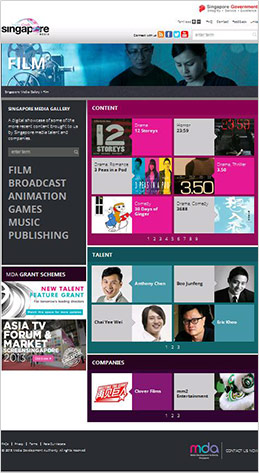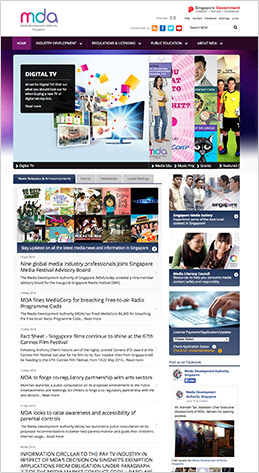Engaging Industry,
Community and Employees
and community
MDA engages the public, industry and community actively through social media platforms such as Facebook, Twitter and YouTube. For example, to raise awareness of our local industry’s flagship events, online contests were held during the week of ScreenSingapore and Asia TV Forum & Market. A series of pop quizzes on Singapore’s TV history was also posted on MDA’s Facebook Page to commemorate 50 years of TV broadcasting.
In the year in review, MDA’s social media engagement grew steadily, with MDA’s Facebook page accumulating some 2,800 fans while its Twitter account has gained more than 7,800 followers. MDA’s YouTube channel, which has 360 videos uploaded, attracted more than 600,000 total views and over 900 subscribers.
As part of MDA’s efforts to better serve the needs of the public and industry stakeholders, its corporate website was also revamped and launched on 6 March 2014. Some of the enhancements include a streamlined navigation menu with content tailored for specific audience needs, a more intuitive sitemap, a Facebook plug-in for social media compatibility and a more mobile-friendly site to adapt to changing consumption habits.
Meanwhile, MDA ramped up the promotion of Singapore media content, talent and companies online by launching a new platform, The Singapore Media Gallery in December 2013. More than 200 titles across the Film, Broadcast, Animation, Games and Publishing sectors are now showcased in the virtual gallery.
Consultation with Committees
Citizen-based committees, comprising members of the public from different age groups, races, religions and professions, provide valuable feedback to MDA on content standards and guidelines and suggest improvements to regulatory frameworks. This ensures that MDA’s content codes and guidelines keep pace with the changing needs and expectations.
There are currently eight consultative committees and two appeal committees. They are:
- Programme Advisory Committee for English Programmes (PACE)
- Advisory Committee for Chinese Programmes (ACCESS)
- Malay Programmes Advisory Committee (MPAC)
- Indian Programmes Advisory Committee (IPAC)
- Arts Consultative Panel (ACP)
- Publications Consultative Panel (PCP)
- Films Consultative Panel (FCP)
- Political Films Consultative Committee (PFCC)
- Broadcast, Publications and Arts Appeal Committee (BPAAC)
- Films Appeal Committee (FAC)
For the year in review, the Films Consultative Panel, the Publications Consultative Panel, the Political Films Consultative Committee, the Indian Programmes Advisory Committee and the Programme Advisory Committee for English Programmes were renewed for further two year terms. The Films Appeal Committee was renewed for another term of three years.
In 2013, there were some changes to MDA’s four broadcast programme advisory committees (PACE, ACCESS, MPAC and IPAC). The terms of reference for the committees were revised with effect from 1 August 2013 to include an additional focus on providing feedback on the quality of locally-produced public service broadcast programmes, in addition to providing feedback on content standards in programmes and advertisements on free-to-air TV, radio and pay-TV channels. The committees will also continue to provide advice to MDA in the formulation and review of broadcast content guidelines.
In addition to the 13 individual committee meetings last year, the broadcast committees also held their first combined meeting on 13 November 2013 to discuss common issues that span across the four languages. At this session, members discussed the innovativeness and effectiveness of content format and topics explored in PSB programmes as well as whether vernacular programmes should use English. More of such meetings are planned in the future to discuss issues that transcend language.
The broadcast advisory committees were consulted on five content cases in 2013. Three of the cases resulted in financial penalties imposed on the broadcasters, and warnings were issued for the remaining cases. The issues surfaced involved religiously insensitive remarks made on radio, portrayal of violence in trailers, a programme with gambling elements, as well as undue prominence given to sponsors in a New Year countdown show and a current affairs series.
The Publications Consultative Panel was consulted on over 30 publications related to religion, sex and nudity in 2013, spanning the range of local and imported magazines, books, and audio materials. In addition, the PCP was consulted extensively on the revised Content Guidelines for Local Lifestyle Magazines, and its views, together with those of the industry, helped to strengthen MDA’s review of the guidelines that were implemented in November 2013.
Last year, the Films Appeal Committee (FAC) received one appeal for a film which had sexually explicit illustrations of sexual acts and religiously offensive comments and was Not Allowed for All Ratings (NAR) by MDA. The FAC upheld MDA’s decision on grounds that the content had failed to respect local values and sentiments and exceeded the Film Classification Guidelines.

